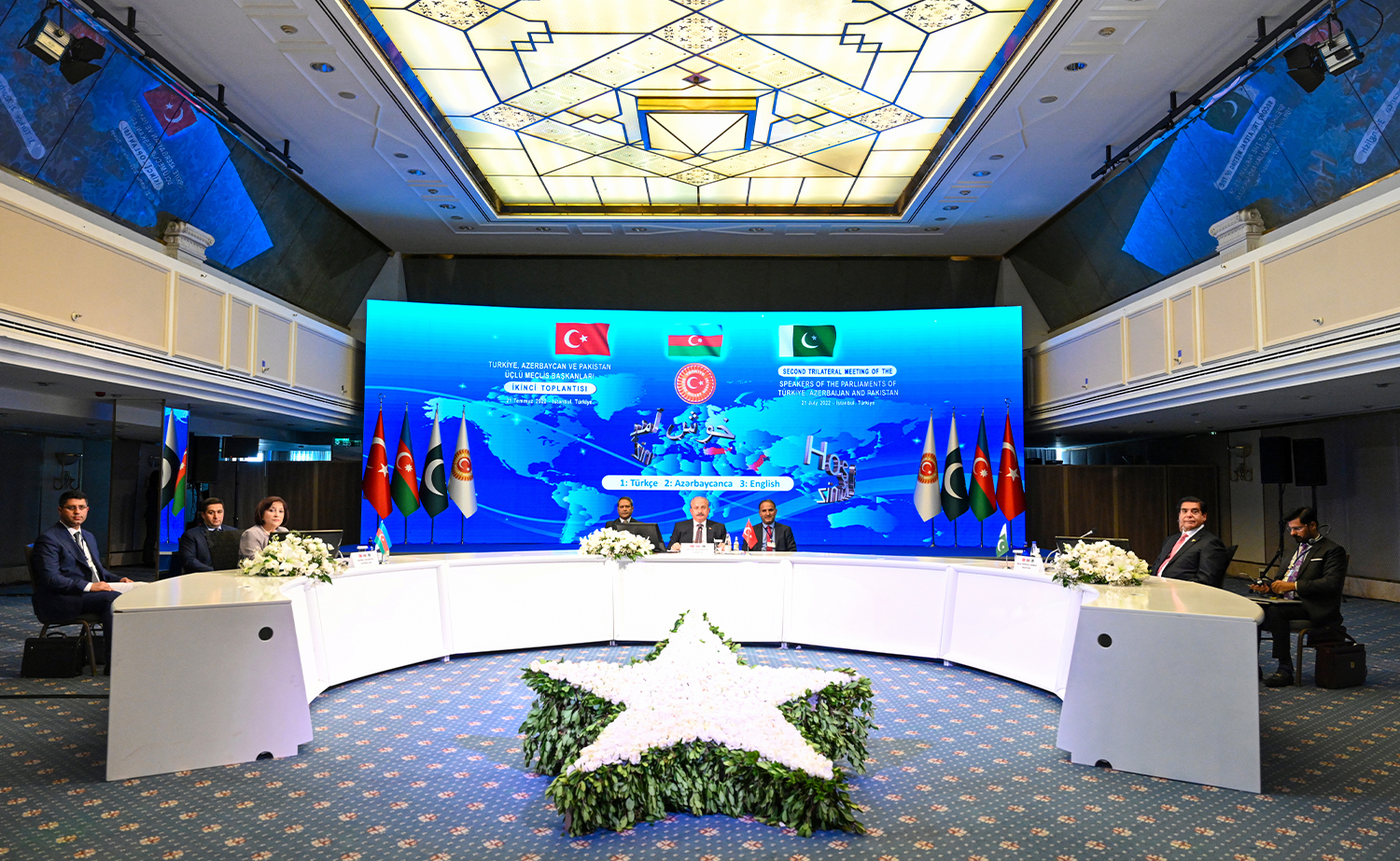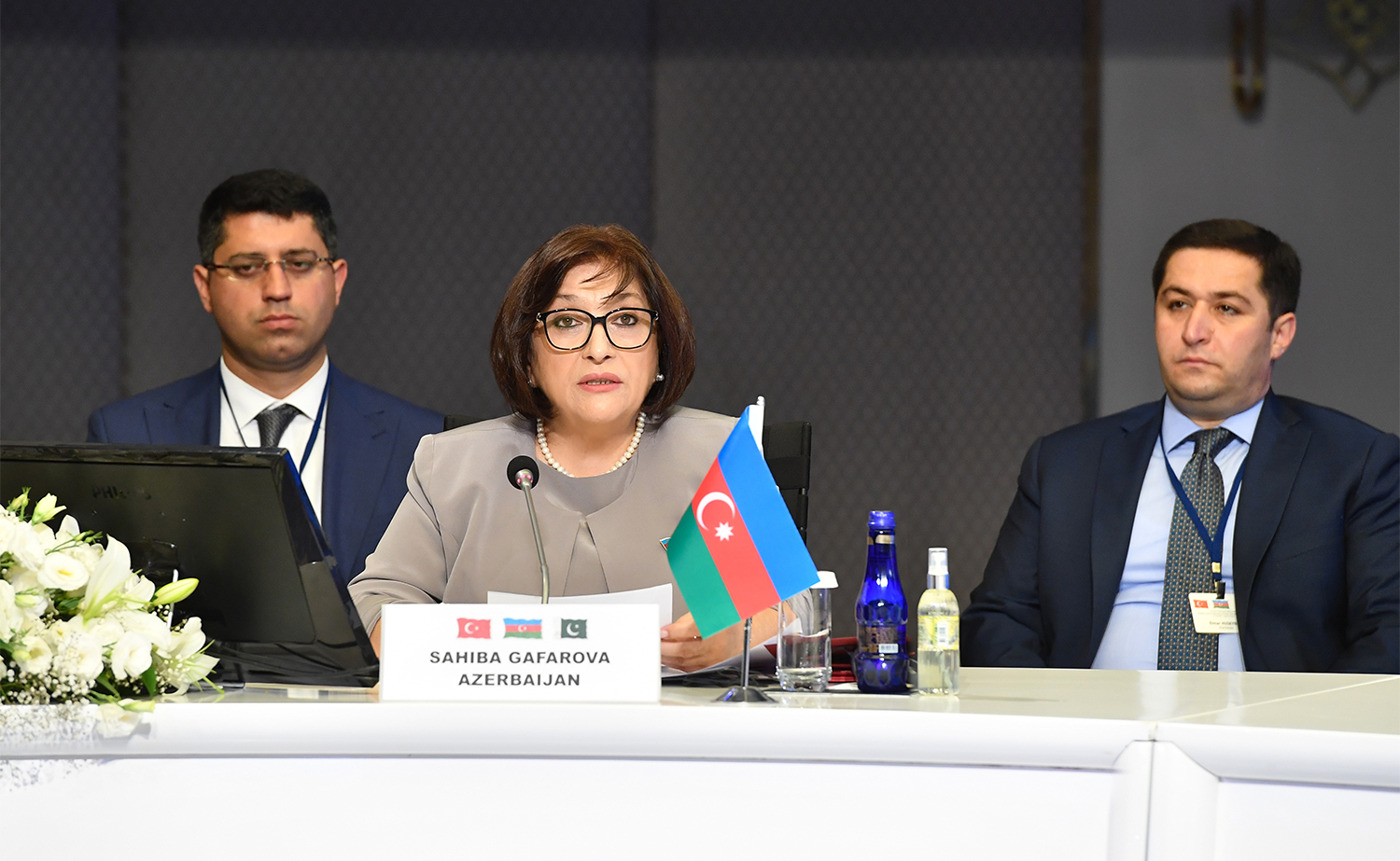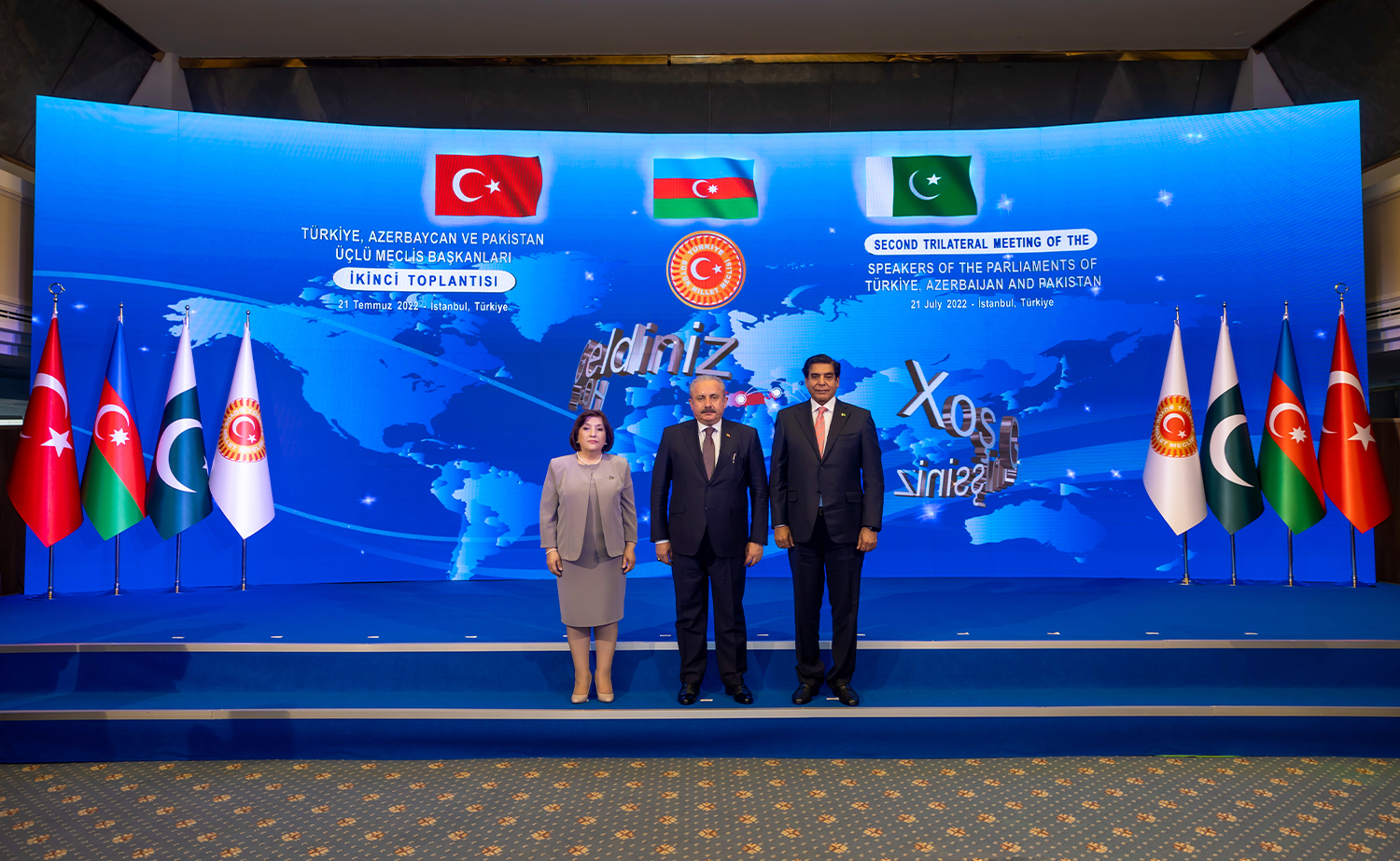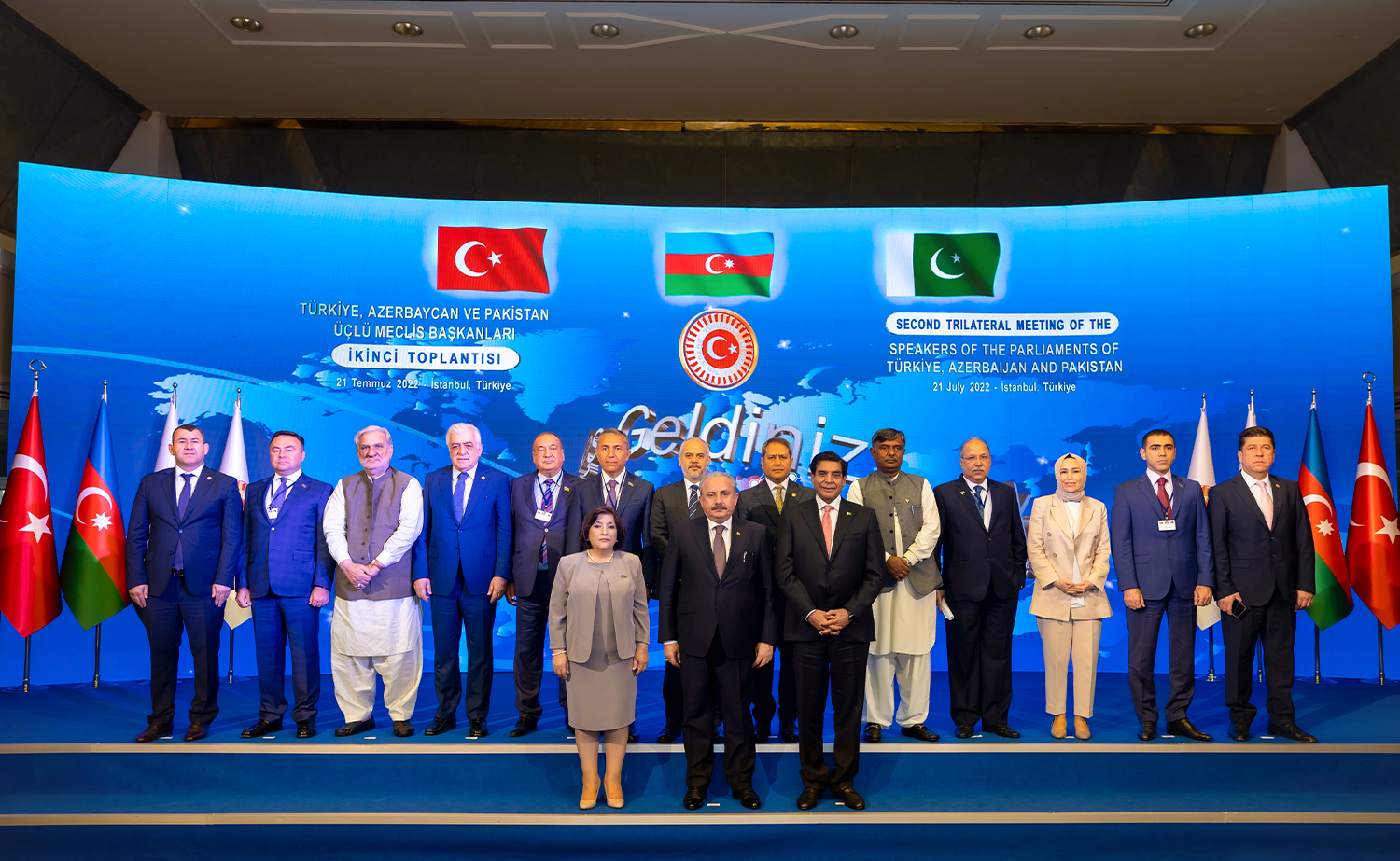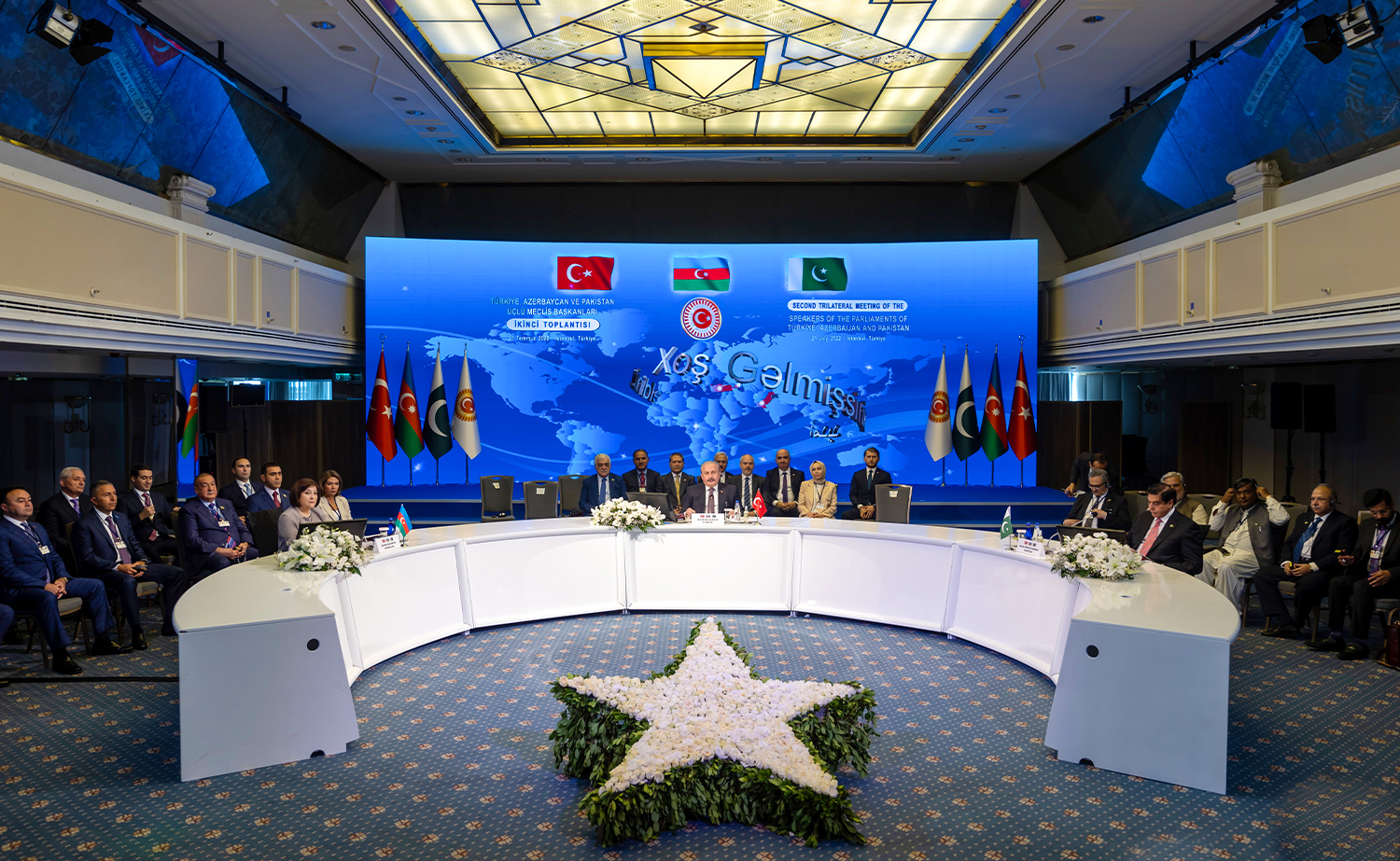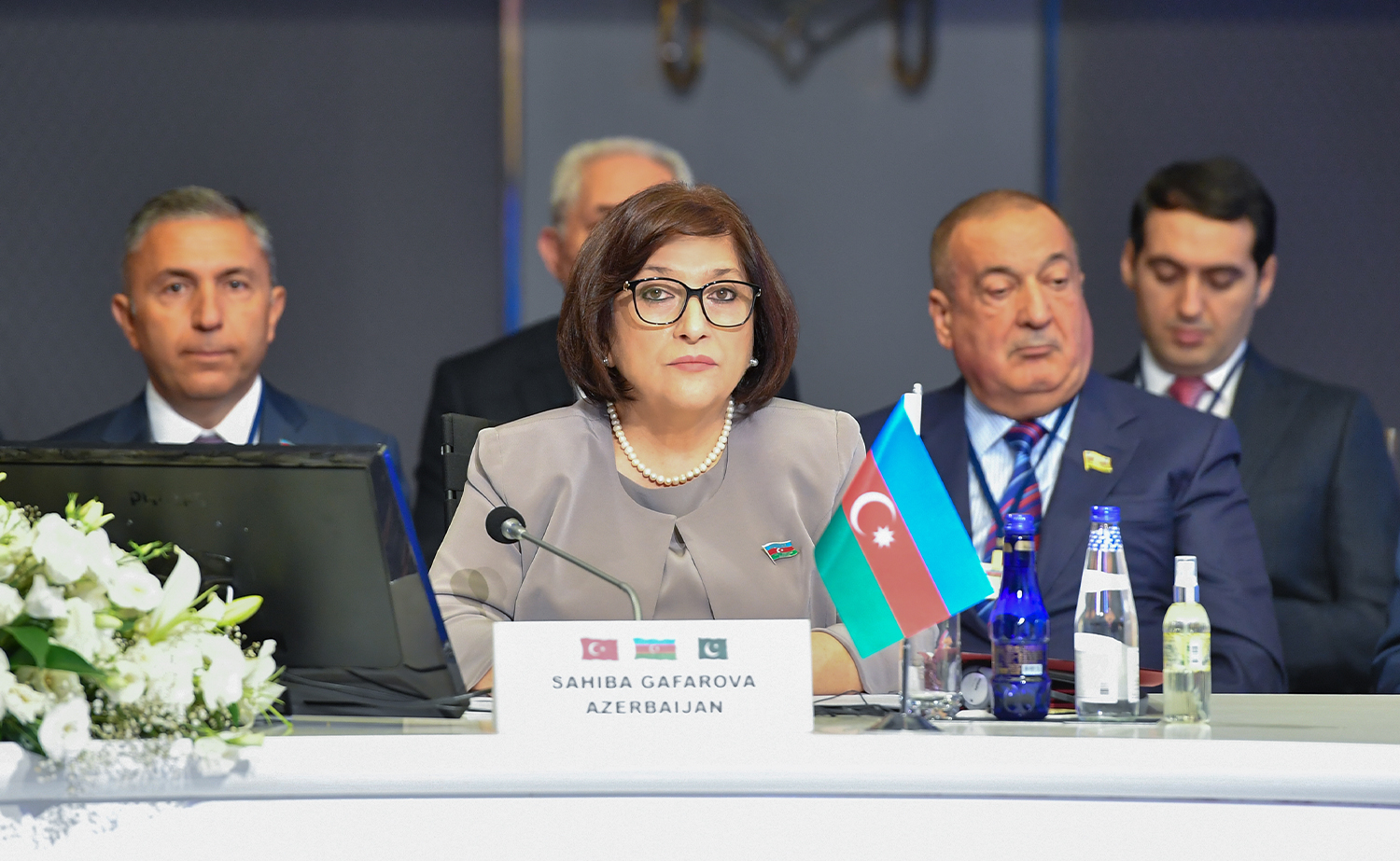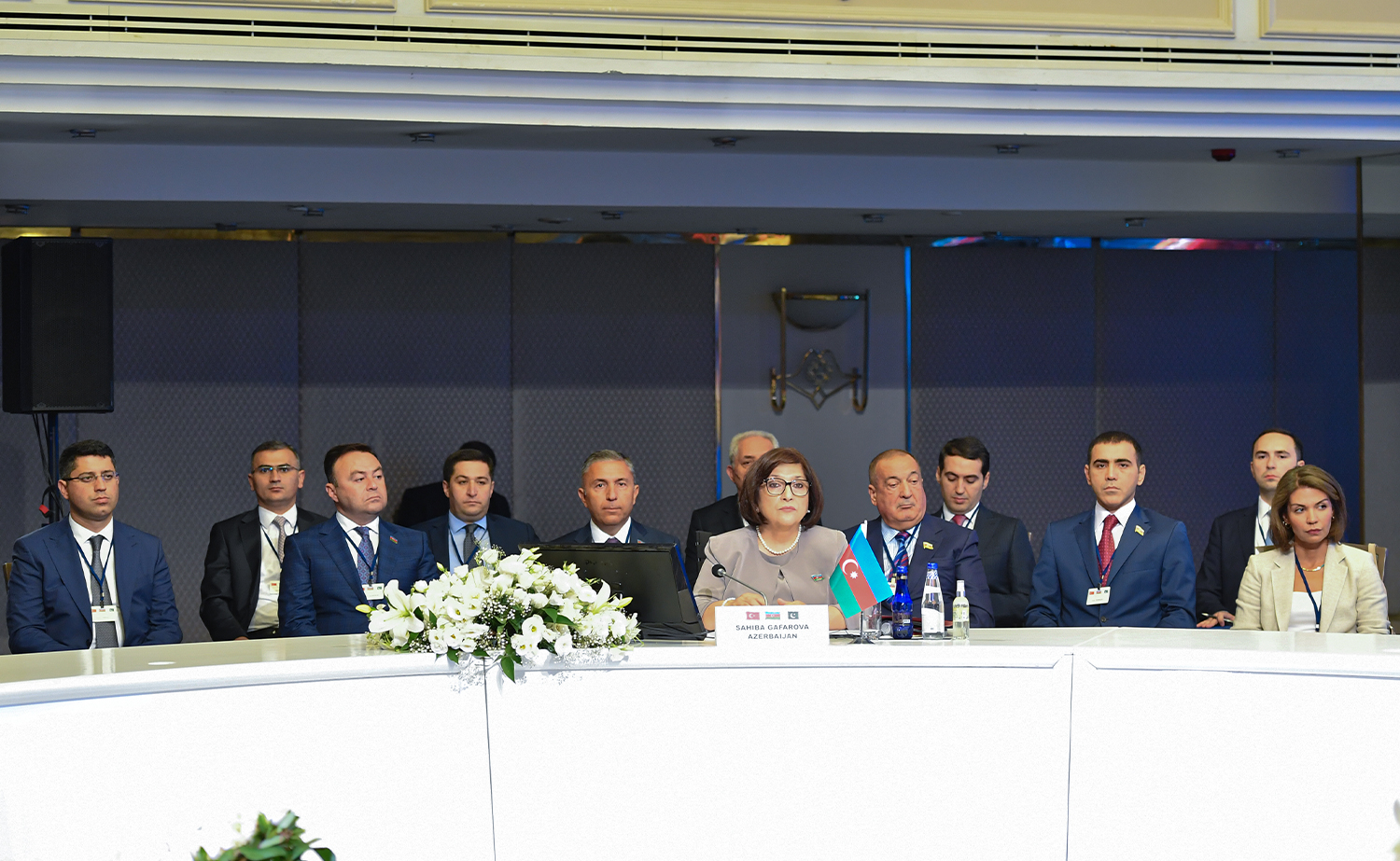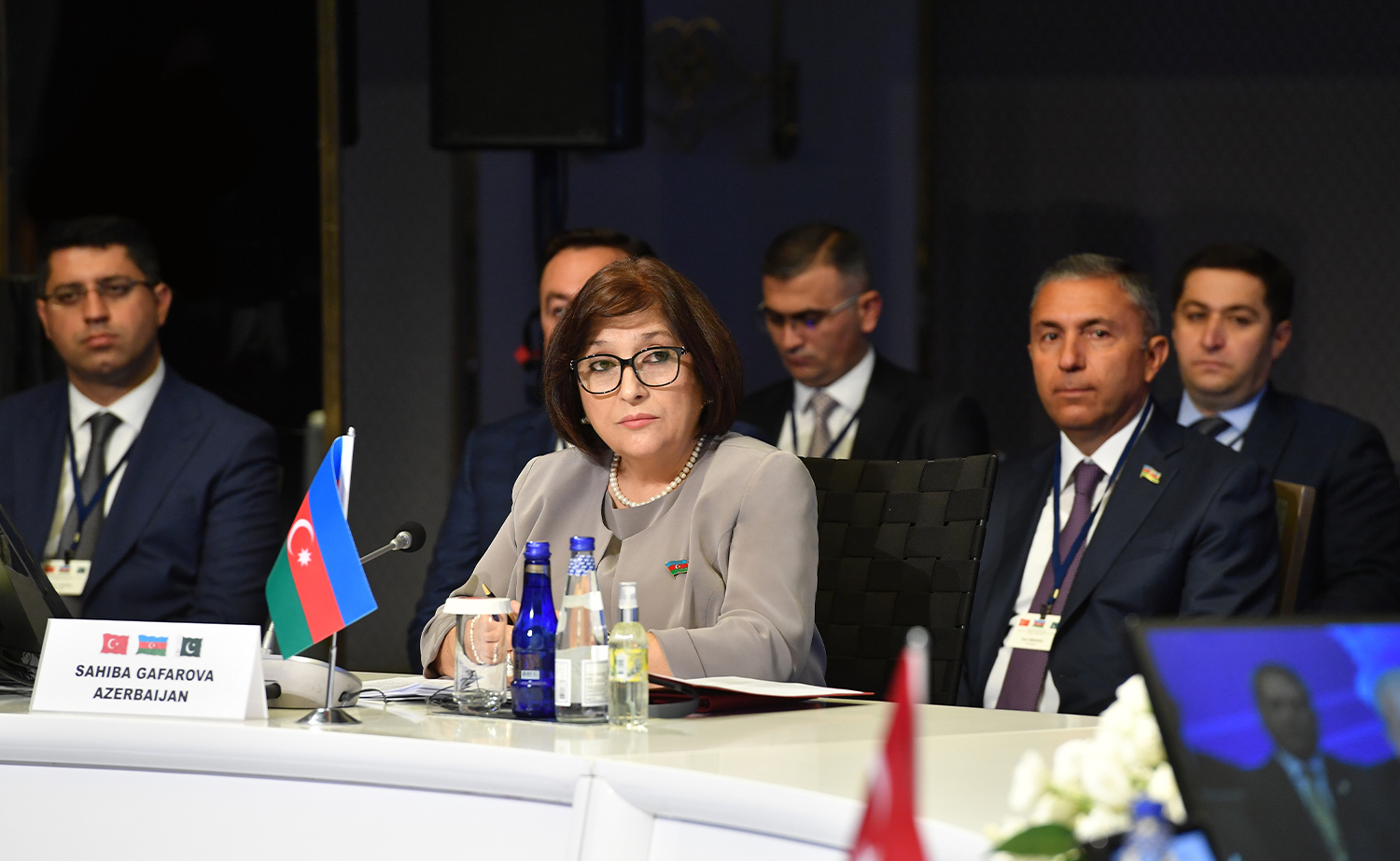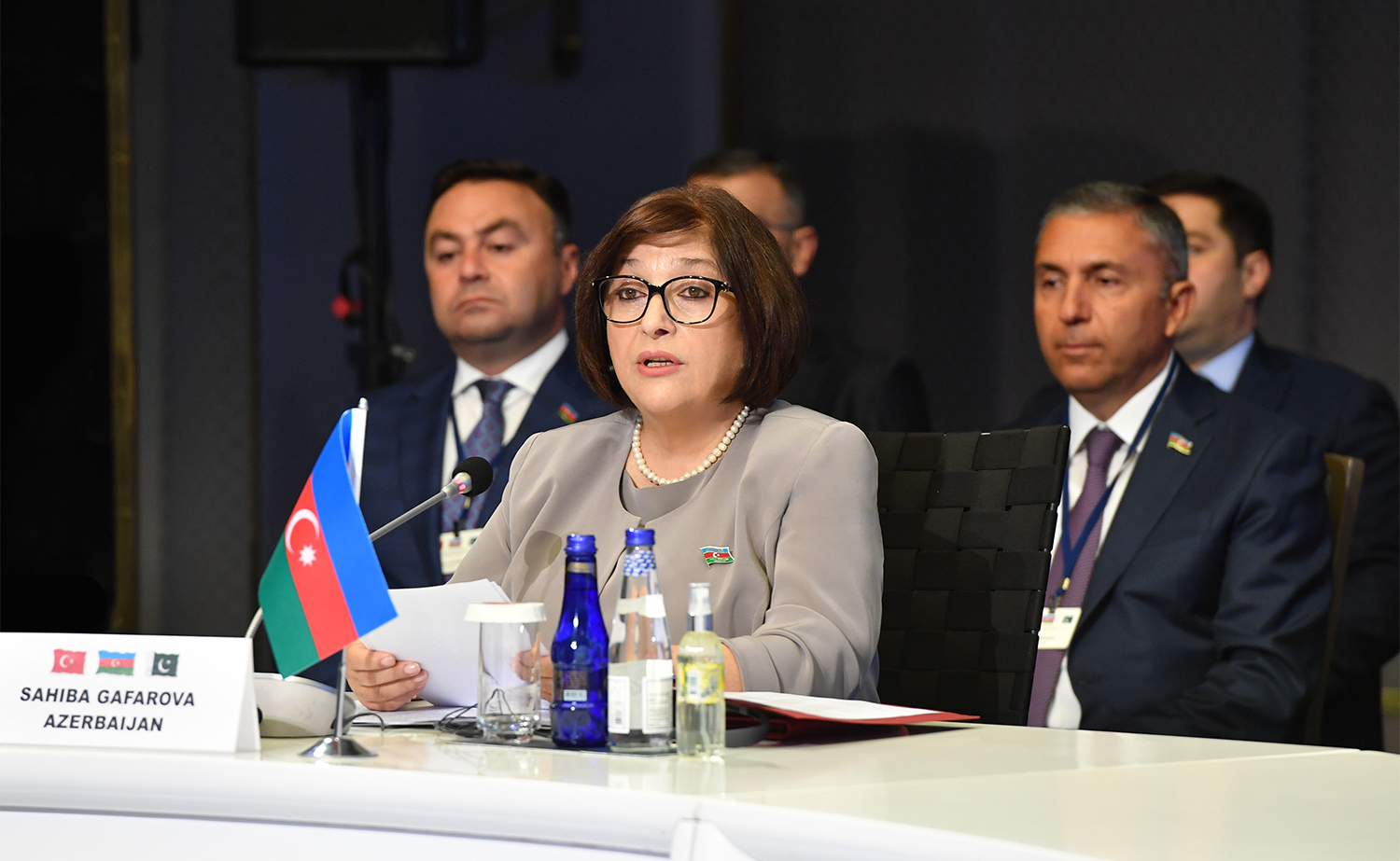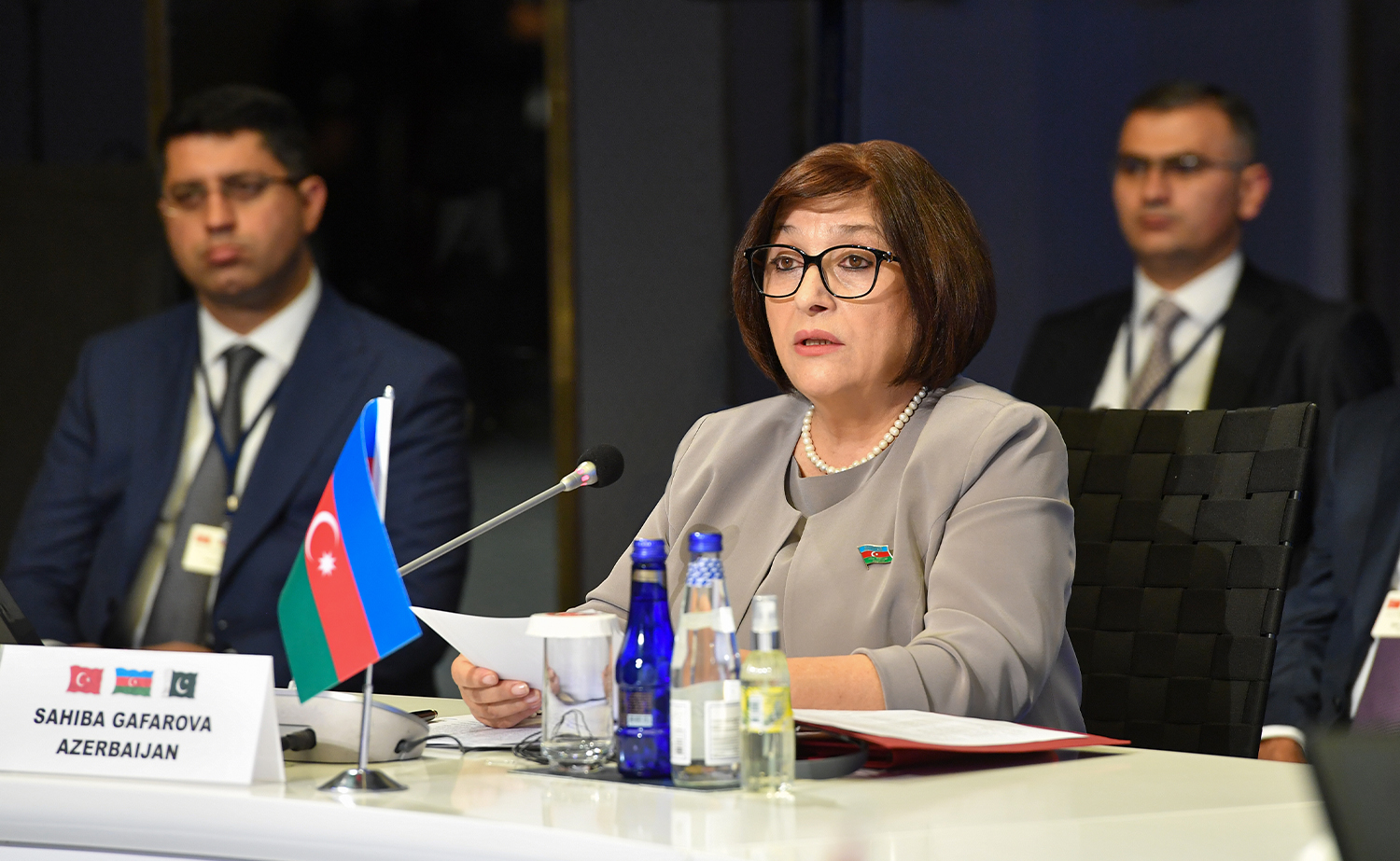Second Trilateral Meeting of Azerbaijani, Pakistani, Turkish Parliament Speakers Takes Place
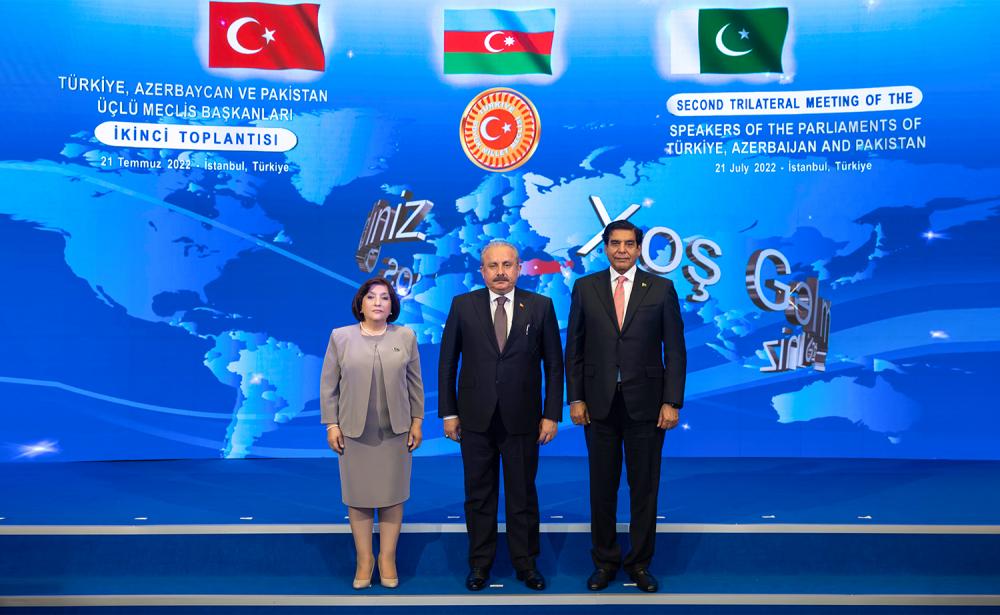
The second Trilateral Meeting of the Chairs of the parliaments of Azerbaijan, Pakistan and Turkey has taken place in Istanbul on 21 July.
The trilateral was forerun by an executive sitting called to consider organisational matters; besides, the parliaments’ leaders commented on the proposed discussion points. Chair of the Milli Majlis Sahiba Gafarova underlined the immense significance of the Azerbaijan-Pakistan-Turkey triple co-operation format. Today’s high level of interaction amongst the fraternal countries calls for further expansion of their connexions in diverse fields, according to Mrs Gafarova who pointed out the weighty input in this cause coming from the close co-operation of the three states afoot under the aegis of international organisations – including on the parliamentary plane.
The second Trilateral Meeting of the Chairs of the Azerbaijani, Pakistani and Turkish parliaments proper followed.
In his opening notes, Chairman of the Grand National Assembly of Turkey Mustafa Şentop underlined the fact that the relations amongst our countries were unlike ties between other countries.
‘Nurtured and strengthened by the common history, culture and religion, our fraternity has evolved to set the standards that are within the reach of but few nations and countries. Turkey, Azerbaijan and Pakistan are coming to the fore as three of the biggest Muslim World democracies. The unique relations amongst our nations have manifested themselves in the mutual support given at the most difficult times,’ Mr Şentop was saying.
He referred to the justice restored in the Garabagh Area of Azerbaijan and said that the eventual opening of the Zangazur Corridor would increase the region’s economic prosperity.
Chair of the Milli Majlis Sahiba Gafarova greeted the participants on behalf of the Azerbaijani parliament and expressed her gratitude to the leader of the GNAT Professor Mustafa Şentop for having made this meeting possible and for the cordial hospitality alike. Mrs Gafarova said she trusted that forthcoming discussions to be held and decisions to be made at the session were certain to make the triple co-operation stronger yet in the name of the interests and successes of our countries and nations.
The speaker of the Azerbaijani legislature mentioned the sixth Democracy and National Unity Day celebrated in the brotherly Turkey on the 15th of July. On that day six years ago, the Turkish people had demonstrated national unity and solidarity. The Turks had rallied to their leader, President Recep Tayyip Erdogan, to save the independence and sovereignty of their Motherland and to stand up for their statehood and democracy. It was with deep veneration that Sahiba Gafarova commemorated the shahids who had given their lives while the coup attempt had been discouraged. She said that the people and state of Azerbaijan had condemned that treacherous putsch encroachment in no uncertain terms from its very first instances – and had shown that they stood by Turkey as ever.
Sahiba Gafarova continued to recall the expiry of one year since the first Trilateral Meeting of the leaders of the parliaments of Azerbaijan, Pakistan and Turkey held upon the initiative of the Milli Majlis of the Azerbaijan Republic. The triple co-operation format was adopted at that meeting. The Baku Declaration passed there and then reflected the tasks and goals ahead in this new format. Today’s meeting, then, is a clear sign of the joint efforts made to achieve those goals and realise those tasks; it is also the unequivocal token of our shared resolve to carry on with the common cause.
The leader of the Milli Majlis said with conviction that the tri-partite co-operation of the Azerbaijani, Pakistani and Turkish parliaments ensued from the modern realia and was a phenomenon birthed by the call of the time. Azerbaijan’s bilateral relations with both Turkey and Pakistan rest on our nations’ fraternity as much as they do on their historical and cultural bonds, mutual respect and mutual trust. The inter-state connexions standing upon such solid a foundation have been furthered purposefully and comprehensively throughout the expired period. They stand out for close collaboration, joint activities and mutual support in the international arena with regards to all the matters of shared concern.
As she spoke about the liberation of the Azerbaijani lands under the leadership of Commander-in-Chief and President Ilham Aliyev after close to three decades of Armenian occupation, Sahiba Gafarova mentioned the open political and moral backing of Turkey and Pakistan to the cause of freeing those territories. The support, extended both internationally and during the Garabagh War II, was the expression of our brotherly nations’ unity and solidarity and, at the same time, it spelled the high level of connexions amongst our states. Doubtless, with the connexions’ continued reinforcement all that beckons us to the continued promotion of those connexions trilaterally as well as in the multilateral format.
The triple co-operation platform that we incepted last year is tremendously important in this relation. We, members of parliaments, represent our nations and as we carry out our nations’ wishes we serve the process of making the bonds between the brotherly nations stronger. On the other hand, we are propping the efforts of our states to further the Azerbaijani-Pakistani-Turkish relations and co-operation; we also make a contribution of our own to the common cause, according to Mrs Gafarova.
The pandemic that still persists today, the armed conflicts, climatic change, the food, energy and humanitarian crises and a myriad other challenges put a serious pressure on the existing system of international relations. At the same time, alas, double-standard approaches are there yet, too. We still witness injustice, violations of the international law, selective attitudes to certain countries and discrimination. Parliamentary diplomacy as a means of preserving international co-operation takes on a formidable role in such circumstances.
Parliaments are not merely the bodies passing laws today. Rather, their roles have been enlarged considerably in the modern epoch; already parliamentary diplomacy has evolved into a substantial international collaboration medium and provides additional channels of inter-state co-operation and dialogue whilst also contributing to the handling of national concerns. Together with the national governments, parliamentary diplomacy is working on protecting national interests.
The triple co-operation platform of the Chairs of the Azerbaijani, Pakistani and Turkish parliaments offered a principally new parliamentary diplomacy framework in our region, in the opinion of Sahiba Gafarova. She emphasised this exemplary co-operation being guided by the international law’s standards and principles and aiming solely to achieve peace, stability and progress. The goals held in mind when the platform was created included closer co-operation over regional and global issues of shared interest and formulating the three brotherly countries’ parliaments’ common stances in international organisations. It is gratifying that our attendance of international parliamentary entities’ sittings and other various events as well as the outcomes of the joint attendance that the expired period has seen is telling us that we were able to accomplish that task and enrich our combined activities more.
There are sound opportunities to strengthen the ties amongst our parliaments further in the practical sense and in accordance with the triple co-operation agenda. Since we represent our legislative assemblies, we ought to resort to every means of supporting and bolstering the efforts that our respective governments are making in such areas as trade, transport, mutual investments, energy, education, tourism and cultural exchange, Mrs Gafarova continued.
In addition, interaction between our parliamentary committees, friendship groups and female MPs will help make our common platform stronger, too.
As she continued her speech, the Chair of the Milli Majlis told about the steps Azerbaijan is taking to achieve peace, stability and sustainable economic development in the region. Sahiba Gafarova said that our country was busy eliminating the appalling consequences of the three decades of Armenian occupation. The whole infrastructure, subjected to total destruction during the occupation period, is being built anew right now.
The leaders of the GNAT and Pakistan’s National Assembly, Mustafa Şentop and Raja Pervaiz Ashraf eye-witnessed the scale of destruction but also the re-construction work under way in the freed Azerbaijani lands as they travelled to the towns of Fuzuli and Shusha in May this year. New towns and villages are being built in Garabagh and East Zangazur which were declared the green energy zone. The gradual repatriation of a small number of the former IDPs has begun already.
Sahiba Gafarova noted with regret that the intensive Armenian mining of those lands during the years of occupation was one of the biggest problems holding up the rebuilding work. More than 220 people have been killed or wounded in the explosions of those mines since 10 November 2020. Despite this, Azerbaijan remains amongst the countries in receipt of the least international humanitarian demining aid.
Trilateral meetings of the leaders of Azerbaijan and Armenia, called and attended by President Charles Michel of the EU Council, have taken place. Armenia has accepted officially Azerbaijan’s five basic principles to underlie the eventual peace treaty. The first bilateral meeting of the ministers of foreign affairs of Azerbaijan and Armenia took place on 16 July. And yet, Armenia is not taking practical steps to start peace treaty negotiations; not only that, but Armenia is also evading the obligations that the Trilateral Statement of 10 November 2020 imposed on it.
Meanwhile, the Armenian administration should comprehend that honouring those obligations clears the only path to peace and stability in the region. The opening of the Zangazur Corridor and of the other regional communication arteries will greatly enhance the transport potential of the region and would do Armenia itself good as well.
Concluding her speech, Sahiba Gafarova once again thanked Chair of the GNAT Professor Mustafa Şentop for the high organisational standards of the second Trilateral Meeting of the Chairs of the Azerbaijani, Pakistani and Turkish parliaments. The head of the Milli Majlis voiced her confidence that the effective platform supported by the three parliaments served our nations’ interests and would further reinforce the friendly and brotherly bonds of our countries.
Chairman of the National Assembly of the Islamic Republic of Pakistan Raja Pervaiz Ashraf, too, told Chairman of the GNAT Mustafa Şentop of his appreciation of the meeting and the brotherly efforts made. He recalled the meeting held in Baku and thanked also the Azerbaijani side for the high organisational level attained at it.
According to Mr Ashraf, such triple assemblies are very importance in terms of continuing our advancement. Pakistan’s invariable support to Azerbaijan and Turkey will continue being evident and present upon all the platforms, Mr Ashraf remarked before mentioning Azerbaijan’s having freed her lands and stressing the necessity of attaining constant peace and security in the region.
The Press and Public Relations Department
The Milli Majlis



